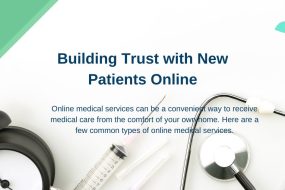
Medical practice faces unique challenges when competing for local patients online. Unlike other companies, health professionals will have to construct confidence by navigating strict rules and managing sensitive patient information. Good news? Local SEO can help your practice stand in the search results and join patients who need as much of your services as possible.
This comprehensive guide will go through local SEO strategies that are proven to be specially designed for doctors and clinics. You will learn how to optimize your online appearance, improve search ranking and eventually attract more patients for your practice.
Why Local SEO Matters for Healthcare Providers
Patients typically search for healthcare services within their immediate area. When someone types “pediatrician near me” or “urgent care clinic,” they want results that are geographically relevant and easily accessible. Local SEO ensures your practice appears in these crucial searches.
Consider these patient behavior patterns:
- Most people search for doctors within a 15-mile radius of their location
- Emergency and urgent care searches often happen on mobile devices
- Patients frequently read reviews before choosing a healthcare provider
- Many people prefer booking appointments online or finding contact information quickly
Your practice needs to be visible during these critical moments when patients are actively seeking medical care.
Claim and Optimize Your Google Business Profile
Your Google Business Profile serves as the foundation of your local SEO strategy. This free tool allows you to manage how your practice appears in Google Search and Maps.
Complete Every Section Thoroughly
Fill out all available fields in your profile:
- Practice name (use your official business name)
- Complete address with suite or building numbers
- Phone number (use a local number when possible)
- Website URL
- Hours of operation, including holiday schedules
- Accepted insurance plans
- Services offered
- Photos of your facility, staff, and equipment
Choose the Right Business Categories
Select primary and secondary categories that accurately describe your practice. Be specific rather than generic. Instead of just “Doctor,” choose “Family Practice Physician” or “Orthopedic Surgeon” based on your specialty.
Add High-Quality Photos
Visual content significantly impacts patient decision-making. Upload professional photos of:
- Your office exterior and interior
- Reception and waiting areas
- Examination rooms
- Staff members (with permission)
- Medical equipment or technology
- Parking areas and accessibility features
Update photos regularly to keep your profile fresh and engaging.
Build Local Citations and Directory Listings
Citations are mentions of your practice’s name, address, and phone number across various online directories. Consistent citations help search engines verify your practice’s legitimacy and location.
Focus on Healthcare-Specific Directories
Start with directories that cater specifically to healthcare providers:
- Healthgrades
- Vitals
- WebMD
- Zocdoc
- Psychology Today (for mental health professionals)
- Specialty-specific directories for your field
Maintain Consistent NAP Information
NAP stands for Name, Address, and Phone Number. Ensure these details are identical across all platforms. Even small inconsistencies, like abbreviating “Street” as “St.” on one site but spelling it out on another, can confuse search engines.
Target Local Business Directories
Don’t overlook general business directories in your area:
- Yelp
- Yellow Pages
- Better Business Bureau
- Chamber of Commerce listings
- Local newspaper business directories
Create Location-Specific Content

Content marketing helps establish your expertise while targeting local search terms. Develop content that addresses your community’s specific health needs and concerns.
Write About Local Health Issues
Research health trends and concerns in your area. Create blog posts addressing:
- Seasonal health issues common in your region
- Local health department announcements
- Community health initiatives you support
- Environmental factors affecting local health
Develop Service-Specific Landing Pages
Create dedicated pages for each service you offer, optimized for local search terms:
- “Family Medicine in [Your City]”
- “Pediatric Care in [Your Neighborhood]”
- “Emergency Care Near [Local Landmark]”
Each page should include detailed service descriptions, your qualifications, and clear calls-to-action for scheduling appointments.
Share Patient Success Stories
With proper consent, share anonymized patient stories that highlight your expertise and care quality. These stories build trust while providing content opportunities for on-page SEO.
Optimize for Mobile and Voice Search
Mobile searches dominate local queries, especially for healthcare services. Patients often search for medical care while experiencing symptoms or during emergencies.
Ensure Mobile-Friendly Design
Your website must load quickly and function seamlessly on mobile devices. Test your site’s mobile performance regularly and address any issues promptly.
Optimize for Voice Search Queries
Voice searches tend to be longer and more conversational. Optimize for questions like:
- “Where is the nearest urgent care clinic?”
- “What are the hours for [Your Practice Name]?”
- “Who is the best cardiologist in [Your City]?”
Include FAQ sections on your website that address common patient questions using natural language.
Manage Online Reviews Strategically
Reviews significantly influence patient decisions and local search rankings. Develop a systematic approach to review management.
Encourage Patient Reviews
Make it easy for satisfied patients to leave reviews:
- Send follow-up emails after appointments with review links
- Provide business cards with QR codes linking to your Google Business Profile
- Train staff to mention reviews during positive patient interactions
- Display signage in your office encouraging feedback
Respond to All Reviews
Respond professionally to both positive and negative reviews. Thank patients for positive feedback and address concerns raised in negative reviews while maintaining patient privacy.
Monitor Review Platforms
Regularly check multiple review platforms:
- Google Reviews
- Healthgrades
- Vitals
- Yelp
- Facebook Reviews
- Specialty-specific platforms
Implement Local Schema Markup
Schema markup helps search engines understand your website content better. For healthcare practices, implement:
- LocalBusiness schema for basic practice information
- MedicalOrganization schema for healthcare-specific details
- Review schema to highlight patient feedback
- FAQ schema for common questions
This structured data can improve your search result appearance and click-through rates.
Learn about Patient Acquisition Strategies
Build Local Link Authority

Earning links from other reputable local websites strengthens your local SEO authority.
Partner with Local Organizations
Collaborate with:
- Local hospitals and medical centers
- Community health organizations
- Schools and universities
- Sports teams and fitness centers
- Senior centers and retirement communities
Participate in Community Events
Sponsor or participate in local health fairs, charity events, and community programs. These activities often result in local media coverage and website mentions.
Guest Post on Local Websites
Write health-related articles for local newspapers, magazines, and community websites. Include your practice information in author bios.
Track and Measure Your Local SEO Success
Monitor your local SEO performance using various tools and metrics:
- Google Analytics for website traffic and user behavior
- Google Search Console for search performance data
- Google Business Profile insights for profile views and actions
- Local rank tracking tools for keyword positions
- Review monitoring platforms for reputation management
Focus on metrics that matter most for healthcare practices:
- Appointment booking calls and form submissions
- “Get Directions” clicks from your Google Business Profile
- Website visits from local search results
- Patient acquisition from online sources
Next Steps for Your Practice
Remember, critical SEO mistakes success requires frequent effort and attention. Begin by revising your current online appearance and identifying the largest gaps. Prefer quick victory like demanding your Google Business profile and securing constant NAP information in directors.
Remember that the local SEO is a continuous process, not one time function. The patient needs to develop, find algorithms and new competitions enter the market. Be committed to providing excellent patient treatment while maintaining a strong online appearance.
Your patients are currently searching for health services online. Make sure they can find your practice when they need you most.


















No Comments